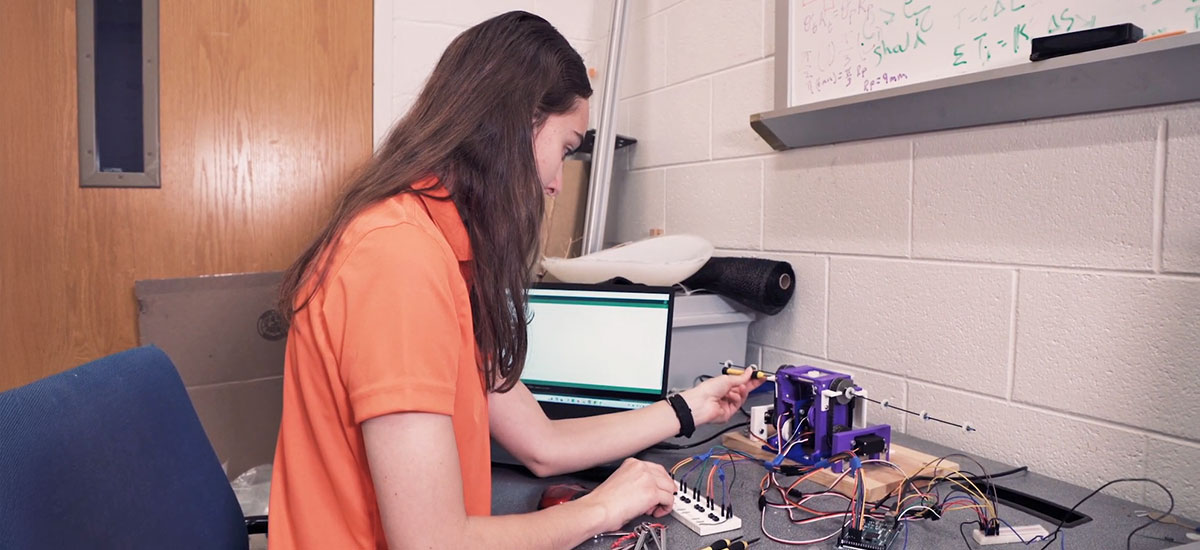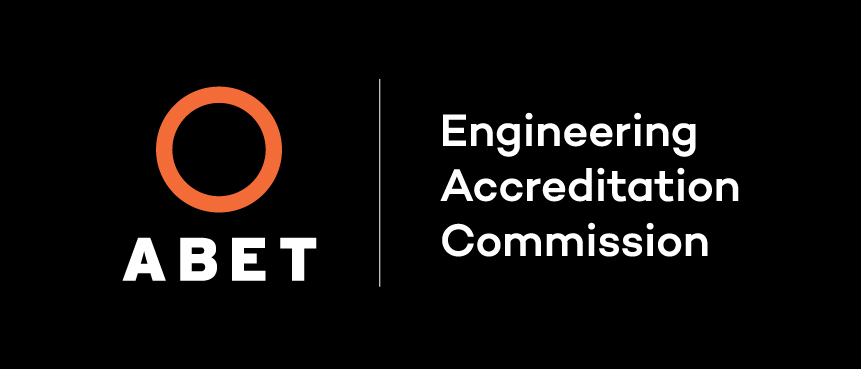
B.S. Program

Transforming Technology: Your Future in ECE
Clemson's Electrical and Computer Engineering department offers distinctive undergraduate programs that combine rigorous technical education with practical innovation opportunities. Our B.S. degrees in Electrical Engineering and Computer Engineering stand out through:
INDUSTRY INTEGRATION
- Strategic location in South Carolina's technology corridor
- Industry-sponsored senior design projects
- Extensive co-op and internship network
- Strong alumni network
- Direct partnerships with BMW, GE, Michelin, and emerging tech companies
ACADEMIC EXCELLENCE
- 12:1 student-faculty ratio
- State-of-the-art Fluor Daniel Engineering Innovation Building
- Research opportunities starting the first year
- Internationally recognized faculty
- Hands-on learning from day one
- Alumni mentorship opportunities
The combination of academic rigor, practical experience, and industry connection creates engineers ready to lead technological innovation immediately upon graduation.
-
Curriculum Overview
Freshman Year
First Semester Curriculum
All Engineering students begin their first term in General Engineering with the same courses, regardless of their intended major. Coursework in the second term varies.
- CH 1010 - General Chemistry (4)
- ENGL 1030 - Composition and Rhetoric (3)
- ENGR 1020 - Engineering Disciplines and Skills (3)
- MATH 1060 - Calculus of One Variable I (4)
- Arts & Humanities OR Social Science Requirement - (3)
Second Semester Curriculum - Electrical
- CH 1020 - General Chemistry (4)
- ENGR 1410 - Programming and Problem Solving (3)
- MATH 1080 - Calculus of One Variable II (4)
- PHYS 1220 - Physics with Calculus I (3)
- Arts & Humanities OR Social Science Requirement - (3)
Second Semester Curriculum - Computer
- ENGR 1410 - Programming and Problem Solving (3)
- MATH 1080 - Calculus of One Variable II (4)
- PHYS 1220 - Physics with Calculus I (3)
- Arts & Humanities OR Social Science Requirement - (6)
B.S. Electrical Engineering credit hours: 129
B.S. Computer Engineering credit hours: 130
Complete curriculum and program requirements for the B.S. degree programs can be found in the Clemson Course Catalog.
Combined B.S./M.S.
Computer Engineering students pursuing a B.S. degree have the opportunity to earn graduate credits during their senior year for the M.S. in Biomedical Data Science and Informatics.
- Seniors with a 3.0 or higher GPA are eligible to request enrollment in graduate-level courses by completing the GS6 form.
- Seniors with an overall GPA of at least 3.4 are eligible to request participation in the Combined Bachelor’s/Master’s Plan. Under this plan, students can reduce the time needed to earn both the B.S. and M.S. degrees by applying graduate credits to both undergraduate and graduate program requirements. Interested students need to complete the GS6 B.S./M.S. form.
-
Department Honors Program
Departmental Honors in Electrical and Computer Engineering requires the following sequence of courses totaling 11 credit hours:
At least 6 credits from the following ECE courses:
- CE 2010 Logic and Computing Devices (3 credits) (offered fall semesters only)
- ECE 2020 Electric Circuits I (3 credits) (offered fall semesters only)
- ECE 2620 Electric Circuits II (3 credits) (offered spring semesters only)
- ECE 3170 Random Signal Analysis (3 credits) (offered spring semesters only)
- ECE 3200 Electronics I (3 credits) (offered fall semesters only)
- ECE 3300 Signals, Systems, and Transforms (3 credits) (offered fall semesters only)
- At least three credits MUST be from ECE 3300 (offered fall semesters only) or ECE 3170 (offered spring semesters only). No honors contracts can replace this requirement.
ECE H3000 Junior Honors Seminar (1 credit)
Four additional credits:
- ECE H4910 Undergraduate Honors Research (4 credits)
- OR a combination of the following (4 credits):
- H2990 Creative Inquiry in EE & CPE (0-1 credits)
- H3990 CI in EE & CPE (0-1 credits)
- H4990 CI in EE & CPE (2-4 credits)
The Departmental Honors Program in Electrical and Computer Engineering provides one of the most comprehensive honors programs in the College of Engineering, Computing and Applied Sciences. The honors program is composed of small classes available to honors students only, capped off by a senior-year research project. The small-section classes are taught in a Socratic fashion and encourage inquiry and debate between faculty and students to stimulate rational thinking and illuminate ideas. The senior-year research project provides students the opportunity to pursue a research topic under the supervision of a faculty advisor.
To be considered for the departmental honors program, you must have a cumulative GPR of 3.40 or higher and meet all the other requirements set up by the CU Honors College.
Students may select the following options associated with the honors thesis:
Option 1 Honors Thesis: This option includes four credits of ECE H4910 taken in the senior year. You will be required to do a literature survey of your chosen topic and to develop a research plan that will develop into an honors thesis. Research will be performed under the direction of a faculty advisor. The honors thesis must meet the standards of the faculty advisor and CU Honors College, and it will require you to provide the Honors Office with a copy of your thesis.
Option 2 Creative Inquiry with Honors Thesis: This option includes four credits that satisfy one of the four combinations: i) ECE H4990 (4 credits) only, ii) ECE H2990 (1 credit) + ECE H3990 (1 credit) + ECE H4990 (2 credits), iii) ECE H3990 (1 credit) + ECE H4990 (3 credits), or iv) ECE 2990 (1 credit) + ECE H4990 (3 credits). The Creative Inquiry (CI) courses may be taken in the sophomore, junior, or senior year. You will work with a faculty advisor individually or as a member of a research team. We have designed the CI program to promote your reasoning and critical thinking skills, ethical judgment and communication skills and a deep understanding of the methods of scientific research. This option may get you involved in research activities earlier and will lead to an honors thesis. The honors thesis must meet the standards of the faculty advisor and CU Honors College and will be required to provide the Honors Office with a copy of your thesis.
Note: The credit hours associated with ECE H4990 or ECE H4910 can satisfy up to 3 credits of the technical elective requirements of the Electrical Engineering curriculum or the Computer Engineering curriculum.
HONORS Courses Fall ONLY: ECE 2010, ECE 2020, ECE 3200, ECE 3300
HONORS Courses Spring ONLY: ECE 2620, ECE 3170
Clemson University Honors College -
Applying to the B.S. or B.S./M.S. Program
Undergraduate Degree
Applicants will apply to Clemson as first-year students if they are students without college credit or if they earned college credit prior to high school graduation. Completion of the first-year General Engineering curriculum and a minimum grade point average of 2.0 or higher are needed to begin an ECE program.
Transfer applications are reviewed on a rolling basis. Admission is based on both high school performance and the quality and amount of previous undergraduate study. Transfer applicants are also admitted into General Engineering and must complete the common first-year curriculum before full admission into an engineering baccalaureate program.
Admission is based on:
- Class standing
- Standardized test scores (SAT or ACT)
- High school curriculum
- Grades
Bachelors-to-Graduate Program
Application for this combined degree program should occur at the end of the junior year to meet the academic standing and GPA requirements. Application details are available in the Academic Regulations section of the Graduate Policies and Procedures Handbook.
How to Apply
Clemson University offers a Coalition Application, Clemson Application, and the Common Application. To learn more about the application process, deadlines, requirements and what to expect after applying, please review the First-Year Application Process.
The GS6-Bachelor-to-Graduate Plan form on the graduate school site (Forms -> Current Students) will serve as your application to the bioengineering graduate program – no additional application is required. However, while the Graduate Record Exam (GRE) is not mandatory, some fellowship applications may require GRE scores.
 The Bachelor of Science in Computer Engineering program is accredited by the
The Bachelor of Science in Computer Engineering program is accredited by the 